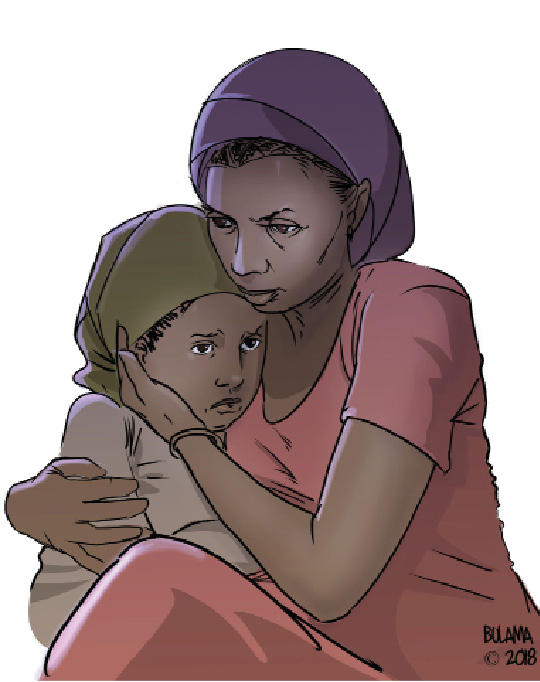In Toni Morrison’s seminal novel Beloved, a slave woman, Sethe, fleeing her wicked, abusive slaver, was confronted with a choice when it seemed obvious that she and her three children were going to be recaptured. In desperation to save her newborn child from the unbearable life of slavery, Sethe chose to kill her newborn daughter.
Sadly, filicide is not restricted to the realm of fiction. Constantly, it manifests in real life far too often and in far more forms than we can imagine. Only this week, in Benue, a Beloved-style filicide was reported when a woman, Sughshater Ushahemba, allegedly killed her 11-month-old daughter. Her motive? Well, it is reported that she simply couldn’t afford to raise the child in the country’s prevalent hardship. On the flip side, it was also reported that the mother claimed that her daughter fell ill at midnight and died. What did not add up was why she was caught trying to dispose of the little corpse, like evidence of a reprehensible crime.
None of the two possible motives are palatable, especially not in the context of the crime committed—be it murder or an attempt to unlawfully dispose of human remains. At the same time, none of the two motives are far-fetched. Country hard. Adults are barely keeping it together these days.
In Kano, 35-year-old Saleh Abdallah made the decision to end his life. His nephew, a young boy, discovered his body hanging in his room and did not immediately understand the concept of suicide. Saleh’s brother said the deceased might have killed himself over the failure of his business and a N400,000 loan he had to repay. It may be that, or it might be that alongside other things. No one is entirely sure because no one could read his suicide note beyond the opening words, “I am sorry.”
A tragedy, no doubt. But not the first. There was a time not too long ago when desperate Lagosians took to jumping into the lagoon to end their lives. Nigeria is a tough country and finds a way of breaking us in very different ways. Sadly, there is very few support system for people with suicidal thoughts. I know of a programme being run by the irrepressible Dr Aishatu Yusha’u Armiyau, the CMD of the Federal Neuropsychiatry Hospital, Kaduna, that is designed to provide professional interventions and prevent as many suicides as possible. Not many people in need of this help will admit to it. Not many of them know how to access this help.
Filicide and suicide, though, are quite different things; apart from the connection to mental health issues, their motives are often different. Some motives for filicide are entirely bizarre and inexplicable.
In 2021, Faith Hassan (20) threw her year-old daughter into a well in Kachia, Kaduna State. Faith had visited her ex-boyfriend, whom she had jilted in the past, hoping to rekindle their relationship. Except now, she had come with a baby that wasn’t his. The young man’s father did not quite like the idea of his son getting involved with someone else’s baby mama and made this known. So overnight, Faith threw her baby in the well. Her accusers said she did it to get the man. She claimed that she did not know what had come over her when she did it.
It is often hard to understand motives when there is no full context. But it is a fact that some parents are overwhelmed by their circumstances and the reality of their existence. Others are possibly suffering from postpartum depression. Yet others are simply callous and irrational, like Kristel A. Candelario, 31, of Ohio, United States, who left her 16-month-old daughter alone in her apartment while she travelled for a 10-day vacation to Puerto Rico. The poor child starved to death.
It is always shocking when news of filicide surfaces because the most enduring bond is often that which exists between a mother and her child. It is spoken of glowingly in the holy books because it is often put in the realm of the divine, a love so pure it is close to God. So, when that perception of maternal love is shattered by extreme acts of cruelty by parents towards their children, we simply can’t comprehend why that is happening. Or how it is possible.
For Sughshater Ushahemba, who allegedly murdered her daughter in Benue, if the story sticks that she did it because of the economic hardship, sadly, this hardship is a reality for a vast majority of Nigerians. The steep rise in commodity prices and the shrinking of earnings and hope has pushed a lot of Nigerians to the wall. While some have a greater resilience, others fold up.
At the moment, the Tinubu administration seemed to be coming to terms with the reality of the economic dog meal it inherited from its predecessor. In faraway Saudi Arabia, the president, perhaps for the first time, publicly admitted that he inherited liabilities. Not a big surprise since everyone knew how former President Muhammadu Buhari left the country looking like a pigsty from hell.
The new president’s National Security Adviser, Nuhu Ribadu, made similar comments while speaking at the Chief of Defence Intelligence Annual Conference saying, “It is okay for me to tell you.”
So perhaps this is a change of policy from this administration that has had to carry the burden of the previous one like an albatross around its neck, silently, because it is the same party. Yes, it is okay to blame the last government for messing things up; after all, the Buhari government spent its first six years blaming the Jonathan government for everything under the sun while it did little to improve the situation.
This government has only just started the blame game. It is only fair to allow it to do this for a while longer because, frankly, it needs to acknowledge sincerely the damage the previous government did before it can start rebuilding.
But blames aside, the kamikaze approach this administration used to announce itself might, in hindsight, not be looking ideal, like that “Subsidy is gone!” proclamation that kickstarted the downward spiral experienced since May 29. It was like jumping into a shallow ditch, all set for a pose, only to discover that the ditch is not a ditch at all but a river with a fast current that sweeps one away ungraciously.
While everything tumbled downhill, though, the choices this administration has been making in imposing austerity on Nigerians while budgeting billions for SUVs for legislators, the office of the first lady and billions for a presidential yacht has been nothing short of astonishing.
If you are wondering how we segued from filicide to this, don’t be confused because I have been talking about the same thing all along.
You see, this impetuous approach to issues that had not been clearly studied and thought out is reminiscent of Faith Hassan hurling her daughter down the well while splurging billions on luxury goods for the officials while the country and its citizens starve re-echoes Candelario dancing the Bomba in Puerto Rico, while her little baby starved to death over 10 days in Ohio. As it is, Nigeria is like a mother with postpartum psychosis, and by its actions and inactions, it is proving to be a hazard to its children, the citizens. This disturbed mother is slowly poisoning some, strangling some, trampling others and causing others to hang themselves. There is an echo of Nigeria, our motherland, in all these mothers.

 Join Daily Trust WhatsApp Community For Quick Access To News and Happenings Around You.
Join Daily Trust WhatsApp Community For Quick Access To News and Happenings Around You.


